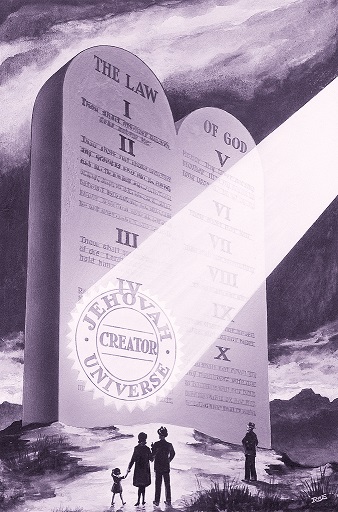Monday: Cross! Take! Divide! Serve!
Daily Lesson for Monday 29th of September 2025
Read Joshua 1:1-18. What can we learn about the structure of the book from this opening chapter?
The first chapter of Joshua serves as an introduction to the whole book. It comprises four speeches that correspond to the four main sections of the book: crossing (Joshua 1:2-9); conquering (Joshua 1:10-11); dividing the land (Joshua 1:12-15); and serving by obedience to the law (Joshua 1:16-18).
The book of Joshua can be seen as a series of divine initiatives. In each initiative, God gives a specific task to Joshua related to the conquest of Canaan, and each one is acknowledged later in the book after its successful completion.
In the end, the promises of God concerning the occupation of the land would be fulfilled. From then on, the responsibility of keeping the land lay in the hands of the Israelites and could be accomplished only by true faith and by the obedience that such faith always engenders.
God’s initiatives, expressed by the three verbs—“cross,” “take,” and “divide”—receive a proper answer in the people’s obedience, which derives from the final initiative: service.
Again, the book of Joshua has four major sections, each characterized by a specific concept expressed through the dominating presence of a Hebrew word:
-
Cross (Joshua 1:1-18; Joshua 2:1-24; Joshua 3:1-17; Joshua 4:1-24; Joshua 5:1-12)
-
Take (Joshua 5:13-15; Joshua 6:1-27; Joshua 7:1-26; Joshua 8:1-35; Joshua 9:1-27; Joshua 10:1-43; Joshua 11:1-23; Joshua 12:1-24)
-
Divide (Joshua 13:1-33; Joshua 14:1-15; Joshua 15:1-63; Joshua 16:1-10; Joshua 17:1-18; Joshua 18:1-28; Joshua 19:1-51; Joshua 20:1-9; Joshua 21:1-45)
-
Service (Joshua 22:1-34; Joshua 23:1-16; Joshua 24:1-33)
Thus, the structure of the book itself conveys its main message: God’s initiatives are not accomplished automatically. Instead, they require the faithful response of His people. That is, with all that God has done for us—including all that He has done for us that we cannot do for ourselves—we are then called to do what we can do for ourselves, which is to obey what God commands us to do. This is how it has always been in all of sacred history, and it remains so today. For example, the depiction of God’s end-time people in Revelation 14:12 conveys the same idea: faith in what God has done for us, which leads to obedience.
|
Think about some of the promises of God’s Word that are most precious to you. What kind of response do they require on your part in order for them to become reality? |
 (1)
(1)

The elephant in the room in this study is that modern Israel right now is in the process of retaking that land at an enormous cost in the lives of innocent people. Part of their justification is that “this is our land”. Carmel and I read the Bible through aloud as part of our daily worship last year and there were chapters in the book of Joshua where we just had to stop reading; it was not the sort of stuff you want to read before you go to bed. It did not escape our attention that we are seeing “take and divide” in action again. Independent sources estimate that more than 65,000 Palestinians and 2000 Israelis have been killed in this conflict and 80% of the deaths have been civilians, many of them women, children, and aid workers.
I interact with atheists who know their Bibles pretty well and understand the parallels of modern-day events with history very well. They also know how some Christians support the modern “take and divide” process. That leaves us with a dilemma. I don’t have a cute one paragraph answer for them and typically we end up with a long discussion about ethics in ancient and modern worlds.
I think we need to remind ourselves that our theological discourses on spiritual lessons from the book of Joshua are occurring against a background of real world conflict destroying the lives of people. While most of us are remote from this tragic conflict, we still interact with people both Christian and secular who have strongly held opinions about it. How do we take part in such discussions to reveal the compassion of Jesus?
Today’s lesson profoundly reminds us that faith without practical obedience is dead. God’s promises must be acted upon tangibly and practically. God’s promises are not passive, but they require active responses: “cross,” “take,” and “divide”. Joshua trusted God in his heart, and the inward conviction was translated into outward practical acts of obedience. All of God’s promises require human participation. Faith in God must cause spiritual vitality. How can we possibly believe that God can do all that He has promised and yet fail to take even one step forward? Faith must manifest visibly.
Noah’s faith was visibly seen by building the ark (Hebrews 11:7).
Abraham’s faith was seen visibly by moving out to an unknown country (Hebrews 11:8).
The Israelites’ faith at Jericho was visibly seen by going around the city seven times (Hebrews 11:30)
Jesus always taught that faith must always be embodied in action.
“Therefore everyone who hears these words of mine and puts them into practice is like a wise man who built his house on the rock”(Matthew 7:24, NKJV).
How can we learn to exercise our inner trust visibly?Our faith will grow tangibly by doing the following spiritual activities:
1) Reading and meditating on the word of God (Romans 10:17)
2) Surrendering our will to God in prayer ( Luke 22:42)
3) Obeying God’s instructions (Hebrews 11:8)
4) By doing acts of love to our fellow human beings (Galatians 5:6)
5) By persevering through the trials that come our way (1 Peter 1:7)